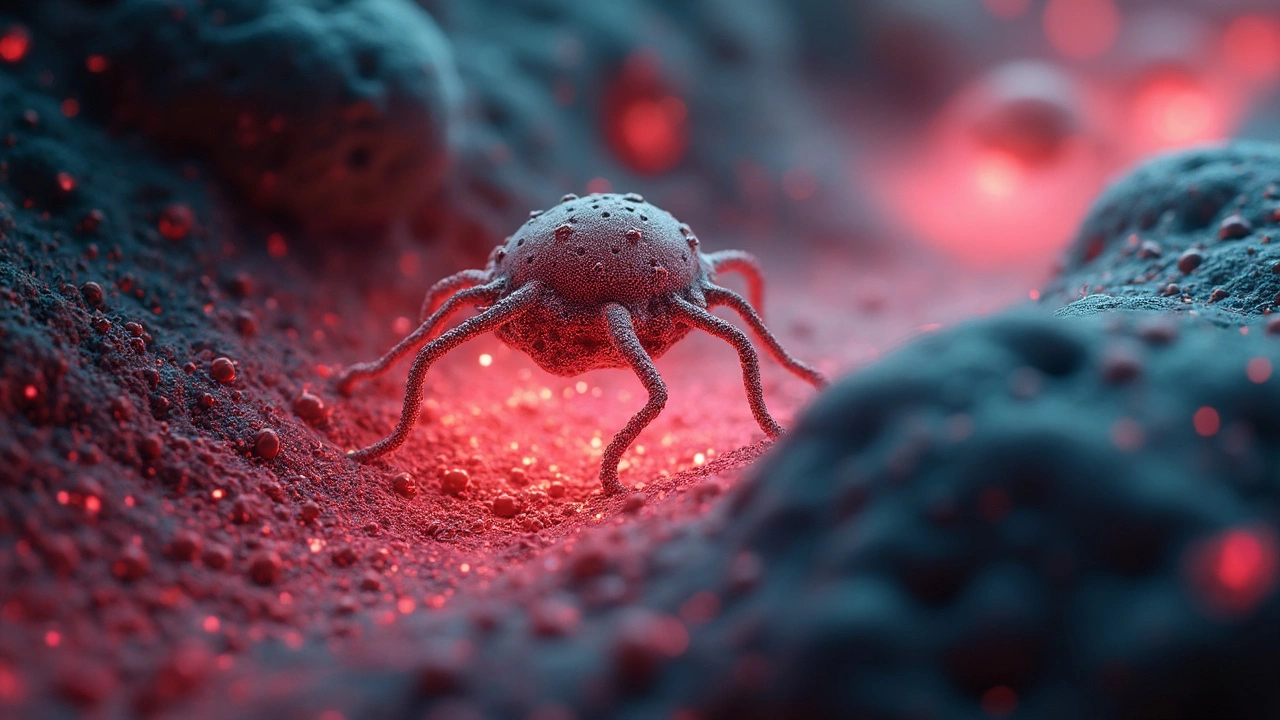Nano what? That's the reaction I first got when I brought up nanotechnology at a family dinner. But trust me, it's not just a buzzword scientists throw around to sound smart. It's a game changer, seriously shaping the way we live and do things. Think of it as engineering at the atomic and molecular level—way tinier than anything you can see with your eyes.
Now, imagine this: nanotechnology helps doctors target cancer cells without nuking the healthy ones around them. Yup, that's happening. Or how about making materials so light yet strong that they redefine everything from sports gear to buildings? Welcome to the world of nanotech.
Let’s be real, while most of us were busy grappling with smartphones and smart homes, nanotechnology has quietly been turning fiction into fact. And it’s not just about gadgets; it’s doing wonders for the environment, like cleaning up pollutants. You’d think it's magic, but nope, it's pure science pushing the envelope.
- The Basics of Nanotechnology
- Major Breakthroughs
- Impact on Medicine
- Nanotech in Electronics
- Environmental Applications
- Future Prospects
The Basics of Nanotechnology
So, where did this nanotechnology thing come from, and why should we care? At its core, nanotechnology involves the manipulation of matter on a very small scale—like really tiny, we're talking one billionth of a meter. To put it in perspective, a nanometer is to a meter what a marble is to the Earth. It's that small.
Nanotech's magic lies in its ability to create new materials and devices with mind-blowing applications. These aren't just smaller versions of existing stuff but have entirely new properties. You want to improve drug delivery in the body or make computers faster while using less power? This is the wizardry of nanotech at work.
How It All Began
The idea kicked off in 1959 when physicist Richard Feynman suggested the possibility of manipulating individual atoms. Fast forward to the 1980s—the birth of tools like the scanning tunneling microscope allowed scientists to play around at the nanoscale.
Why Nanotech Matters
Alright, besides being cool, why does nanotech matter for you and me? Because it impacts a ton of sectors:
- Medicine: From delivering drugs more precisely to developing more effective diagnostics, the health industry is seeing a revolution.
- Electronics: Think faster processors and more efficient batteries.
- Environment: Improving solar cells and cleaning pollutants more efficiently.
Still not impressed? Consider this: According to estimates, the global nanotechnology market is set to grow rapidly, reaching several hundred billion dollars in the next few years. This is where future jobs and innovations lie.
In essence, the basics of nanotechnology boil down to controlling tiny to achieve something massive. And that's a journey we're just at the beginning of.
Major Breakthroughs
Nanotechnology isn't just a sci-fi dream anymore; it's an everyday reality that's quietly infiltrating diverse fields with groundbreaking solutions. Here are some of the most impressive advancements we've seen so far.
Medicine: Tiny Titans Against Disease
In healthcare, nanotechnology is a superhero. It’s not just about making stuff smaller; it's about making it smarter. Take cancer treatment, for example. Traditional methods often result in collateral damage to healthy cells. Enter nanoparticles. They're designed to attach to cancer cells while leaving the good ones be. According to a recent study, certain nanoparticle treatments improved target accuracy by over 75%, sparing patients unnecessary side effects.
Electronics: Pushing the Envelope
From faster internet to insanely powerful computing, nanotech is a major player in the electronics world. We're talking transistors that are so small, they make your current microprocessor look like a dinosaur. The 2023 introduction of 2nm chips by a tech giant paved the way for smarter devices that consume way less power yet perform better. Who wouldn't want longer battery life, right?
Energy: Charging Forward
Energy storage is another hot area where nanotech shines. Those electric cars everyone’s talking about? They could go further on a single charge thanks to nano-engineered batteries. Researchers are exploring ways to make batteries more efficient, reducing charge times by half. Imagine juicing up your phone in just a few minutes!
Environmental Cleanup: Fixing Our Mess
Cleaning up the planet is no small task, but it's one where nanotechnology is stepping up. Innovative materials can now help break down pollutants at an unprecedented rate. For instance, a type of nano-filter was developed to remove 99% of heavy metals from water, providing cleaner resources for communities worldwide.
Data Nugget: Growing Market Insight
The nanotechnology market is booming, expected to reach $125 billion by the year 2030, according to industry forecasts. That means more jobs, more innovation, and more everyday applications making life easier.
Seriously, these breakthroughs are just the tip of the iceberg. And while they sound mind-blowing, they're just scratching the surface of what's possible with nanotechnology.
Impact on Medicine
Let’s dive into where nanotechnology really shines: medicine. It’s like science fiction stepping into real life. One of the biggest breakthroughs is in the field of drug delivery systems. With nanotech, doctors can send drugs directly to diseased cells, minimizing damage to healthy ones. This is especially huge for cancer treatment. Instead of blasting the whole area with radiation, nanoparticles can focus solely on the tumor.
Targeted Cancer Therapy
For cancer patients, this means fewer side effects and improved outcomes. The magic lies in creating nanoparticles programmed to hunt down and release therapies right where they're needed. Not only does this mean a more effective treatment, but it also potentially speeds up recovery times. Imagine faster treatments and getting back to life quicker—that's a win.
Detecting Diseases Early
Early detection is another big win thanks to nanotechnology. We're talking about sensors so tiny they can pinpoint diseases much earlier than traditional methods. These sensors can pick up even minute traces of disease markers in the body, catching issues before they become major problems. It's like having a super-sensitive alarm system for your body.
Regenerative Medicine and Tissue Repair
Regenerative medicine has seen a blast forward, too. Scientists are using nanotechnology to create materials that mimic the cellular environments vital for tissue regeneration. In simpler terms, helping bodies heal faster and better. It’s helping with everything from skin grafts to bone repairs. It’s insane how a tiny change on a nano-level can lead to massive benefits in healing speed and quality.
Challenges and Considerations
But, like any tech, it’s not all rosy. We gotta keep an eye out for what happens long-term. Are there any side effects we might be missing? That’s where ongoing research comes into play—whatever doesn’t kill progress makes it stronger, right?
The future looks bright with nanotechnology in the driving seat of medical innovation. As the tech keeps evolving, who knows what other medical marvels are next!

Nanotech in Electronics
Ever wonder what's behind your electronics getting slimmer, more efficient, and smarter by the minute? Spoiler alert: it's nanotechnology. This isn't just tinkering at a small scale; it's like rewiring the electronics industry with a whole new blueprint.
Creating More with Less
One of the coolest things about nanotech is how it redefines performance. Think about your computer's processor. Transistors, the tiny switches that control electrical signals, are getting down to the nano-size. Smaller means you can pack more in, boosting power without adding bulk. This is what makes each new gadget faster than its predecessors without turning into a chunky monster.
Better Batteries
Batteries might not sound glamorous, but they're the lifeline for our gadgets. Enter the nano-revolution: nanotechnology is enhancing battery electrodes to hold way more charge and charge up faster. Suddenly, charging your phone overnight might be as ancient as dial-up internet!
Flexible and Wearable Electronics
Picture this: your smartphone bending like paper or even wearing your tech as clothing. That’s not a wild dream anymore. Nanotech is making electronics flexible and more robust, paving the way for wearable tech that doesn’t compromise on functionality.
| Year | Average Processing Speed Improvement |
|---|---|
| 2020 | 12% |
| 2023 | 18% |
Data like this showcase how advancements are consistently progressing, driven largely by nanotech capabilities.
If this fascinates you, hang tight, because there's even more on the horizon. As nanotechnology continues to evolve, expect your electronics not just to improve in performance and design but to change how you interact with tech altogether.
Environmental Applications
Alright, imagine a world where pollution cleans itself. Sounds like a sci-fi movie, but nanotechnology is making headway in that direction. One of the standout jobs it’s doing is in water purification. Nano-sized filters that can remove toxins, including heavy metals and even bacteria, are transforming access to clean water in places where it’s scarce.
Another breakthrough? Air purification. Certain nano materials can absorb pollutants right out of the air we breathe. This tech is already being integrated into coatings for buildings and vehicles, helping to tackle the headache of urban pollution.
Soil Remediation
Then there’s soil remediation—getting rid of contaminants in soil. Nanoparticles can target and neutralize pollutants, making previously unusable land viable again. This is crucial for areas impacted by heavy industrial activity where the soil has been compromised.
Energy Efficiency
When it comes to energy, nanotechnology isn’t slacking either. It’s all about improving solar cells. Nano coatings on solar panels can boost efficiency, allowing us to capture more energy from the sun. Plus, these coatings can reduce the cost significantly by using fewer materials while producing more power.
Data on Growing Impact
Here's a quick snapshot of how these applications are developing:
| Application Area | Growth Rate |
|---|---|
| Water Purification | 25% annual increase in adoption |
| Solar Energy Efficiency | 15% improvement in energy capture |
We’re at an exciting juncture where tech giants and startups alike are throwing their weight behind making our planet cleaner with nanotechnology. So, keep an eye out—these little wonders are out to save the big wide world.
Future Prospects
So what's coming down the line with nanotechnology? Think Jetsons-level cool, minus the flying cars (for now). There are some seriously mind-blowing developments that scientists and tech folks are working on. Here’s a taste of what's brewing in the nano labs around the world.
Revolutionizing Health Care
In medicine, nanotechnology is set to change the game even more. Imagine personalized medicine with nano-robots swimming through your bloodstream, delivering drugs precisely where they're needed, and reporting back in real time. This isn’t just sci-fi—it’s actively being researched. Nano-sized sensors could monitor bio-markers, alerting to potential issues long before symptoms appear.
Greener Tech and Cleaner Planet
Environmentally, nanotechnology holds the key to major breakthroughs. With the planet’s health in mind, new materials that can absorb carbon emissions or clean water contaminants more effectively are in development. Imagine air purifiers that filter at the nano level or self-cleaning construction materials that reduce maintenance costs and save resources.
Boosting Electronics and Energy Efficiency
Next-gen electronics and energy solutions are also on the horizon. Picture smaller, faster, and more efficient devices. Nanotech enables more storage on chips, extending battery life dramatically. Solar panels are getting a major upgrade with nanomaterials allowing them to capture sunlight more efficiently, potentially boosting adoption and transforming the energy industry.
Table of Future Prospects
| Field | Nanotech Advancement |
|---|---|
| Medicine | Targeted drug delivery, real-time monitoring |
| Environment | Advanced air and water purification |
| Electronics | Enhanced chips, better storage |
The jobs nanotech can do seem limitless, and with a bit of fine-tuning, these grand ideas might not be as far off as you’d think. Pretty soon, nanotechnology might be our everyday go-to for solving those big global challenges.
